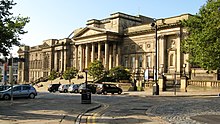Liverpool World Museum
 |
|
| Former name | Derby Museum |
|---|---|
| Established | 1851 |
| Location | William Brown Street, Liverpool, England, United Kingdom |
| Coordinates | 53°24′36″N 2°58′53″W / 53.409992°N 2.981323°W |
| Visitors |
605,601 (2009) |
| Director | David Fleming OBE |
| Website | www.liverpoolmuseums.org.uk |
605,601 (2009)
World Museum is a large museum in Liverpool, England which has extensive collections covering archaeology, ethnology and the natural and physical sciences. Special attractions include the Natural History Centre and a planetarium. Entry to the museum is free. The museum is part of National Museums Liverpool.
The museum has recently undergone extensive refurbishment in order to double the size of the display spaces, making even more of the collections accessible for visitors. Major new galleries include World Cultures, the Bug House and the Weston Discovery Centre. A central entrance hall and six-storey atrium opened in 2005. On reopening after this refurbishment and extension the museum's name changed from its previous title of Liverpool Museum, which it had held since its establishment at its current William Brown Street site in 1860.
The museum was originally started as the Derby Museum as it comprised the Earl of Derby's natural history collection. The museum opened originally in 1851, sharing two rooms on Duke Street with a library. However, the museum proved extremely popular and a new, purpose-built building was required.
Land for the new building on a street then known as Shaw's Brow opposite St. George's Hall was donated by local MP and Merchant William Brown, as was much of the funding for the building which would be known as the William Brown Library and Museum. Around 400,000 people attended the opening of the new building in 1860.
In the late 19th century, the museum's collection was beginning to outgrow its building so a competition was launched to design a combined extension to the museum and college of technology. The competition was won by William Mountford and the College of Technology and Museum Extension opened in 1901.
Liverpool, being one of the UK's major ports, was heavily damaged by German bombing during the blitz. While much of the Museum's collection was moved to less vulnerable locations during the war, the museum building itself was struck by German firebombs and suffered heavy damage. Parts of the museum only began to reopen fifteen years later.
...
Wikipedia
